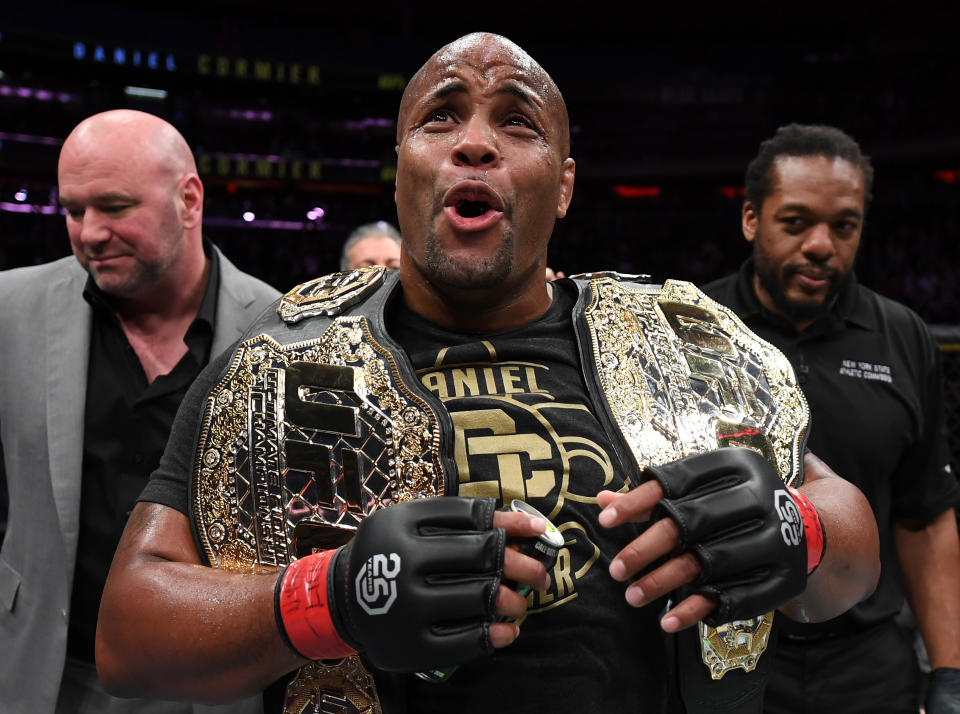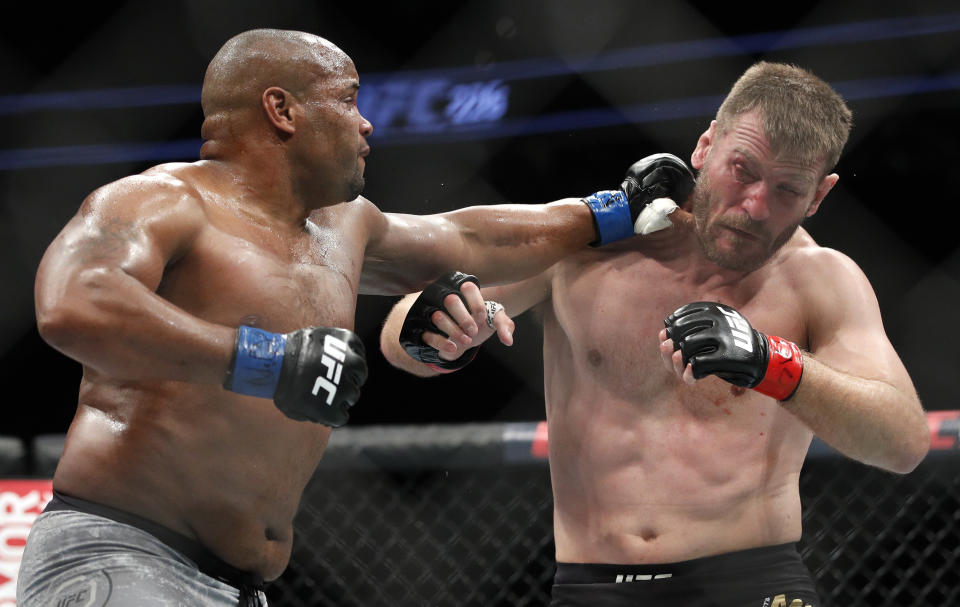Daniel Cormier plans to go out on top after a career full of ups and downs
SAN JOSE, California — Daniel Cormier is 40 years old and lives the type of life that many only dream of living.
He’s one of the greatest mixed martial arts fighters who ever lived. He’s a respected MMA television analyst, arguably the best to ever do that job. He is one of only four fighters to hold two UFC weight class championships simultaneously.
He’s a two-time American Olympian and was the captain of the 2008 U.S. Olympic wrestling team. He was a two-time junior college national champion, an NCAA All-American and a six-time senior U.S. national champion, winning every year from 2003 through 2008, inclusive.
He’s rich and famous, revered by not only fans around the world, but also by so many within the industry.
He’s the reigning UFC heavyweight champion and is No. 1 on its pound-for-pound list. Yet, for all of his successes, his story can’t accurately be told without discussing the unspeakable tragedies he’s endured or the epic losses he’s suffered.
In 1986, when Cormier was 7, his father, Joseph, was murdered in cold blood. In 2003, as he was attempting to qualify for the U.S. Olympic wrestling team which would compete in Athens, Greece, the following year, his 3-month old daughter, Kaedyn, died in a traffic accident.
For all the success he has had in his life, he’s had more than his fair share of failure. He lost important matches in the waning seconds, failed to make weight for an Olympic match and suffered kidney failure that nearly killed him.
Through it all, though, he managed to pull himself back up and refocus on his goal of becoming the best at what he’s done.

He’s on the backstretch of his career, and his bout on Saturday in a rematch with Stipe Miocic in the main event of UFC 241 for the heavyweight championship at the Honda Center in Anaheim, California, could be his last. At 40 years old, the future, at least as far as MMA goes, is short.
This is a man who clawed his way to the top, who struggled to make a living and briefly was on public assistance. He had an income of $1,500 a month — all from a sponsor — and his rent was $1,300. He had an extra $200 for everything else, which at the time included an infant son.
He married Salina Deleon in 2017, but they had a son in 2011. Cormier by this time was 6-0 as an MMA fighter, but he wasn’t cashing in much on his success. He was serving as the wrestling coach at the American Kickboxing Academy and helped Cain Velasquez defeat Brock Lesnar at UFC 121 on Oct. 23, 2010 to win the heavyweight title.
He was living a far from comfortable life, however.
“Her and I had a $175 [a month] buffer to try to make it every month,” Cormier said of his early days as an MMA fighter. “I would teach wrestling lessons and honestly, my wife got on government assistance when we were first starting out to get our baby his milk and his food and for us to eat for a little bit. Luckily for me, I didn’t take long. I was so lucky in the sense that I had people who really cared about me and my journey.
“Salina, she didn’t want to do that. She was a hard-working lady when she met me. She had to leave our job to move to San Jose to be with me. She sacrificed everything. She up and took a chance on my dream to come here and make a family with me and hope that at some point I could make a life for us.”
His co-managers, Bob Cook and DeWayne Zinkin, would front him his sponsorship money if the check were late so his rent would be paid. They’d pay for items that he’d need but couldn’t afford.
We’re not talking extravagances, either. It’s not like he was using the money he earned to buy a fancy car or some bling. They were giving him money for gas, so he could get back and forth to practice.
There are a lot of managers who do that for their fighters when the fighter is starting out, only to be brushed aside when the fighter makes it big.
Cormier, though, is a rare breed. Cook and Zinkin are like family to him, because he remembers what they did in order to help him achieve his dream.
“My management has never changed, and it never will,” Cormier said. “We’re on this thing together. There’s just a lot of people who took chances to give me a shot. And through hard work, I’ve actually made it.”
He became just the second fighter in UFC history to hold two titles simultaneously, following Conor McGregor.
He scored a knockout of Miocic at UFC 226 on July 7, 2018, to add the heavyweight crown to the light heavyweight belt he’d already owned.

Miocic was widely regarded as the greatest heavyweight in UFC history going into that bout. That title is now held by Cormier, who is 5-0 in the UFC as a heavyweight and 16-0 as a heavyweight overall.
And while Cormier insists he has the utmost respect for Miocic, don’t for a second believe he feels that KO was a fluke.
“For as good of a fighter as Stipe is, there are a lot of weaknesses and glaring holes in his game,” Cormier said. “I don’t think people realize that. That was one of them. There are a few other things that allowed me to land on him quite a bit in one round. We were going tit-for-tat.
“I just think it’s a good matchup for me. Ultimately, he’s a wrestler-boxer and I feel like if I’m fighting a wrestler-boxer, I’m going to win.”
He’s done a tremendous amount of winning. He was 101-9 with 89 falls and three Louisiana state championships in high school. He was 61-0 with 33 falls and two national titles in junior college. At Oklahoma State, he was 53-10 with 27 falls and was an All-American as a senior.
He’s 22-1 with a no-contest as a pro MMA fighter and has two championships.
None of it, though, would have been possible without the tragedy he overcame in his life.
“Being resilient and being ultra-competitive [helped me overcome the tragedies in my life],” Cormier said. “I think you have a choice when things like that happen with the tragedy and not accomplishing the ultimate goals. You can say, ‘This will ruin me,’ or ‘I’m going to use this to propel me to even greater things.’ That’s not always easy. Sometimes you want to give up. I’ve dealt with adversity not only personally, but in competition.
“From being in the NCAA Finals with Cael Sanderson and losing the Olympic bronze medal match up 2-0 in overtime and giving up three points with a minute left in the match to not win the bronze medal, to not wrestling at the Olympics the second time to losing to [Jon] Jones twice. I’ve had to deal with a lot of things professionally also, but I always try to remind people that with all these failures, I’d earned the right to fail. They didn’t say, ‘DC, you’re a great guy. You’re going to wrestle for an NCAA title.’ Or, ‘You’re a great guy, you’re going to wrestle for an Olympic medal.’ I had to earn those things and through my resilience and my competitiveness, I’ve earned those opportunities.”
More from Yahoo Sports:

 Yahoo Finance
Yahoo Finance 
